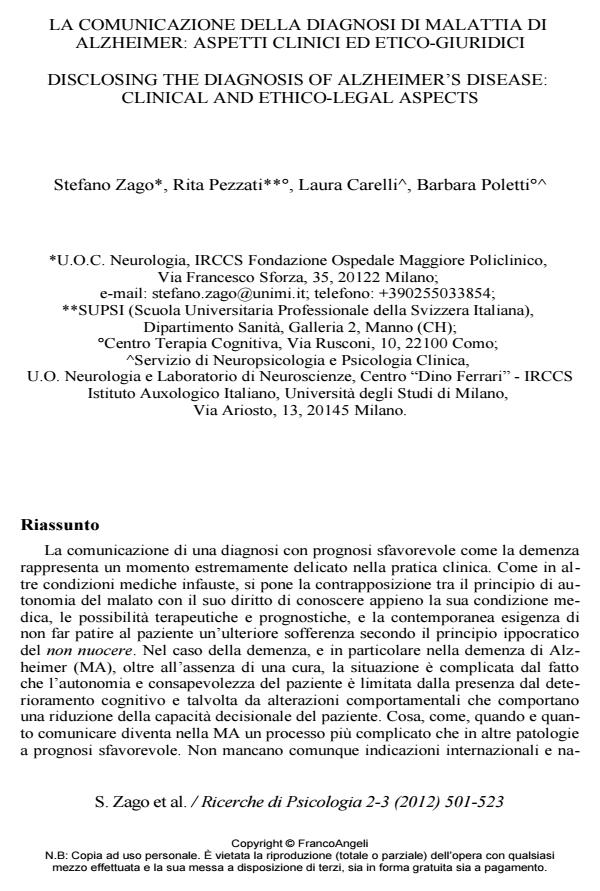La comunicazione della diagnosi di malattia di alzheimer: aspetti clinici ed etico-giuridici
Titolo Rivista RICERCHE DI PSICOLOGIA
Autori/Curatori Stefano Zago, Rita Pezzati, Laura Carelli, Barbara Poletti
Anno di pubblicazione 2013 Fascicolo 2012/2-3
Lingua Italiano Numero pagine 23 P. 501-523 Dimensione file 284 KB
DOI 10.3280/RIP2012-002023
Il DOI è il codice a barre della proprietà intellettuale: per saperne di più
clicca qui
Qui sotto puoi vedere in anteprima la prima pagina di questo articolo.
Se questo articolo ti interessa, lo puoi acquistare (e scaricare in formato pdf) seguendo le facili indicazioni per acquistare il download credit. Acquista Download Credits per scaricare questo Articolo in formato PDF

FrancoAngeli è membro della Publishers International Linking Association, Inc (PILA), associazione indipendente e non profit per facilitare (attraverso i servizi tecnologici implementati da CrossRef.org) l’accesso degli studiosi ai contenuti digitali nelle pubblicazioni professionali e scientifiche.
La comunicazione di una diagnosi con prognosi sfavorevole come la demenza rappresenta un momento estremamente delicato nella pratica clinica. Come in altre condizioni mediche infauste, si pone la contrapposizione tra il principio di autonomia del malato con il suo diritto di conoscere appieno la sua condizione medica, le possibilita terapeutiche e prognostiche, e la contemporanea esigenza di non far patire al paziente un’ulteriore sofferenza secondo il principio ippocratico del non nuocere. Nel caso della demenza, e in particolare nella demenza di Alzheimer (MA), oltre all’assenza di una cura, la situazione e complicata dal fatto che l’autonomia e consapevolezza del paziente e limitata dalla presenza dal deterioramento cognitivo e talvolta da alterazioni comportamentali che comportano una riduzione della capacita decisionale del paziente. Cosa, come, quando e quanto comunicare diventa nella MA un processo piu complicato che in altre patologie a prognosi sfavorevole. Non mancano comunque indicazioni internazionali e na- zionali tese a sviluppare una prassi consolidata che tenga conto degli aspetti diagnostici, terapeutici, etici-deontologici e medico-legali legati in merito alla comunicazione della diagnosi di demenza.
Parole chiave:Comunicazione diagnosi, malattia di Alzheimer, famigliari, caregiver.
Stefano Zago, Rita Pezzati, Laura Carelli, Barbara Poletti, La comunicazione della diagnosi di malattia di alzheimer: aspetti clinici ed etico-giuridici in "RICERCHE DI PSICOLOGIA " 2-3/2012, pp 501-523, DOI: 10.3280/RIP2012-002023